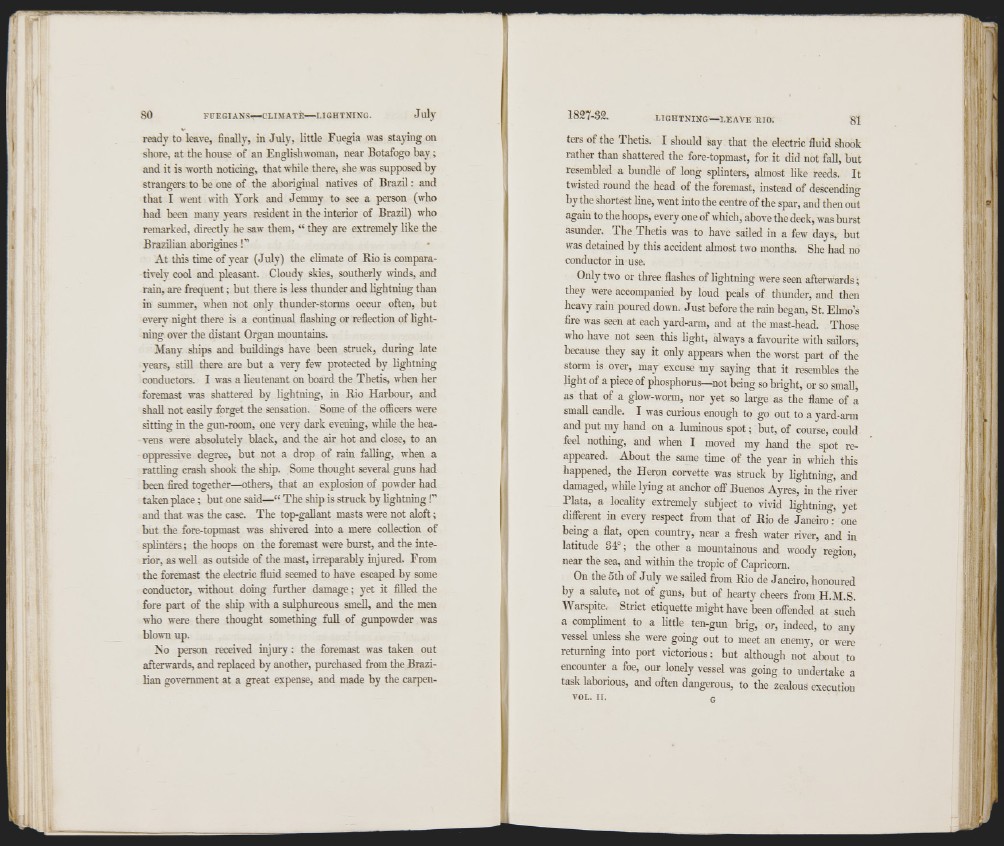
80 FUEGIANS CLIMATE LIGHTNING. July
ready to leave, finally, in July, little Fuegia was staj'ing on
shore, at the house of an Englishwoman, near Botafogo bay ;
and it is worth noticing, that while tliere, she was supposed by
strangers to be one of the aboriginal natives of Brazil ; and
that I went with York and Jemmy to see a person (who
had been many j-ears resident in the interior of Brazil) who
remarked, directly he saw them, “ tliey are extremely like the
Brazilian aborigines !"
At tliis time of year (July) the climate of Rio is compai-a-
tively cool and pleasant. Cloudy skies, southerly winds, and
rain, are frequent ; but there is less thunder and lightning than
in summer, when not only thunder-storms occur often, hut
every night there is a continual flashing or reflection of lightning
over tlie distant Organ mountains.
Many ships and buildings have been struck, during late
years, still diere are hut a very few protected by lightning
conductors. I was a lieutenant on board tlie Thetis, when her
foremast was shattered by lightning, in Rio Harbour, and
shall not easily forget the sensation. Some of the officers were
sitting in the gun-room, one very dark evening, while tlie heavens
were absolutely black, and the air hot and close, to an
oppressive degree, but not a drop of rain falling, when a
ratdincr crash shook the ship. Some tliought several guns had
been fired togetlier—others, that an explosion of powder had
taken place ; but one said—“ The ship is struck by lightning !”
and that was the case. The top-gaUant masts were not aloft ;
but the fore-topmast was sliivered into a mere collection of
splinters ; the hoops on the foremast were burst, and the interior,
as well as outside of the mast, irreparably injured. From
the foremast the electric fluid seemed to have escaped by some
conductor, without doing further damage; yet it filled the
fore part of the sliip with a sulphureous smell, and the men
who were there thought something full of gunpowder was
blown up.
No person received injury : the foremast was taken out
afterwards, and replaced by another, purchased from the Brazilian
government at a great expense, and made by the carpen1827
32. l i g h t n i n g — LEAVE RIO. 81
ters of the Thetis. I sliould say that the electric fluid shook
rather than shattered the fore-topmast, for it did not fall, but
resembled a bundle of long splinters, almost hke reeds. It
twisted round the head of the foremast, instead of descendino'
by the sliortest line, went into the centre of the spar, and then out
again to the hoops, every one of \riiicli, above the deck, was hurst
asunder. The Thetis was to have sailed in a few days, hut
was detained by this accident almost two months. She had no
conductor in use.
Only two or three flashes of lightning were seen afterwai-ds;
they were accompanied by loud peals of thunder, and then
heavy rain poured down, ju s t before the rain began, St. Ehiio’s
fire was seen at each yai-d-arm, and at the mastJiead. Those
who have not seen this light, always a favourite iritli saQors,
because they say it only appeal's when the worst part of the
storm IS over, may excuse my saying that it resembles the
light of a piece of phosphorus—not being so bright, or so small,
as that of a glow-worm, nor yet so large as the flame of a
small candle. I was curious enough to go out to a yard-arm
and put my hand on a luminous spot; but, of course, could
feel nothing, and when I moved my hand the spot reappeared.
About the same time of the year in which this
happened, the Heron corvette was struck by lightning, and
damaged, wliile hfing at anchor ofi^ Buenos Ayres, in the river
Plata, a locality extremely subject to vivid lightning, yet
different in every respect fr-om that of Rio de Janeiro; one
being a flat, open country, near a fresh water river, and in
latitude S T ; the other a mountainous and woody region,
near the sea, and witlun the tropic of Capricorn.
On the 5th of July we sailed from Rio de Janeiro, honoured
by a salute, not of guns, but of hearty cheers from H.M.S.
AVarspite. Strict etiquette might have been offended at such
a compliment to a httle ten-gun brig, or, indeed, to any
vessel unless she were going out to meet an enemy, or were
returning into port victorious; but although not about to
encounter a foe, our lonely vessel was going to undertake a
task laborious, and often dangerous, to the zealous execution
VOL. I I . G
il'll
i: (
11 • ■
I iV
i